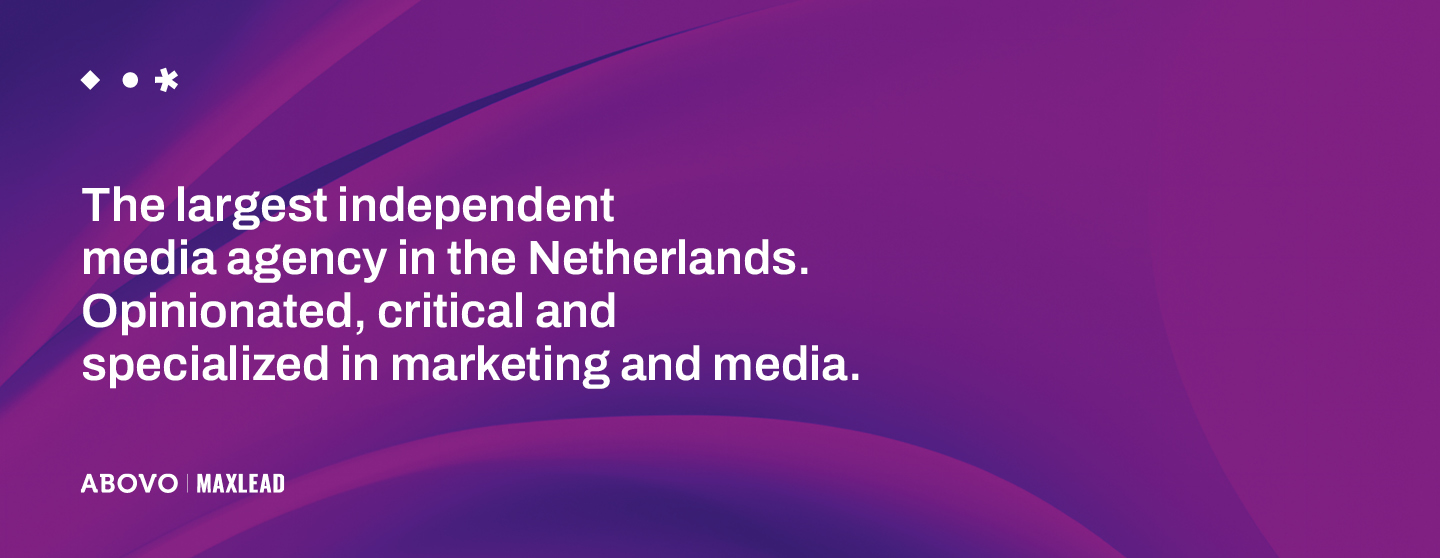

Abovo Maxlead

North Holland, Netherlands The
June 2025
Advertising & market research
Service with Minor Environmental Footprint
Belgium,
Netherlands The,
Slovakia
Abovo Maxlead is a leading full-service marketing and media agency with its headquarters based in the Netherlands, specializing in media, performance marketing, content and creation, and data and tech. We support a wide range of businesses (from SMEs to international brands) in building effective, ethical, and results-oriented marketing solutions. We characterize ourselves as challengers; we like to challenge our clients, as well as being challenged by them. As a proud B Corp certified company, we believe in transparency, responsible advertising, and in helping brands grow while contributing to a more sustainable and inclusive world. Our core services include online marketing, offline media, and strategy. We implement these services using a wide range of specializations, such as B2B lead generation, SEO, SEA, social media, display, TV, radio, and out-of-home advertising. With locations in Hoorn, Oegstgeest, and Bratislava, we work with commercial and non-profit organizations that value sustainability, innovation, and social impact.
Overall B Impact Score
Governance 17.7
Governance evaluates a company's overall mission, engagement around its social/environmental impact, ethics, and transparency. This section also evaluates the ability of a company to protect their mission and formally consider stakeholders in decision making through their corporate structure (e.g. benefit corporation) or corporate governing documents.
What is this? A company with an Impact Business Model is intentionally designed to create a specific positive outcome for one of its stakeholders - such as workers, community, environment, or customers.
Workers 36.7
Workers evaluates a company’s contributions to its employees’ financial security, health & safety, wellness, career development, and engagement & satisfaction. In addition, this section recognizes business models designed to benefit workers, such as companies that are at least 40% owned by non-executive employees and those that have workforce development programs to support individuals with barriers to employment.
Community 21.2
Community evaluates a company’s engagement with and impact on the communities in which it operates, hires from, and sources from. Topics include diversity, equity & inclusion, economic impact, civic engagement, charitable giving, and supply chain management. In addition, this section recognizes business models that are designed to address specific community-oriented problems, such as poverty alleviation through fair trade sourcing or distribution via microenterprises, producer cooperative models, locally focused economic development, and formal charitable giving commitments.
Environment 14.0
Environment evaluates a company’s overall environmental management practices as well as its impact on the air, climate, water, land, and biodiversity. This includes the direct impact of a company’s operations and, when applicable its supply chain and distribution channels. This section also recognizes companies with environmentally innovative production processes and those that sell products or services that have a positive environmental impact. Some examples might include products and services that create renewable energy, reduce consumption or waste, conserve land or wildlife, provide less toxic alternatives to the market, or educate people about environmental problems.
Customers 3.1
Customers evaluates a company’s stewardship of its customers through the quality of its products and services, ethical marketing, data privacy and security, and feedback channels. In addition, this section recognizes products or services that are designed to address a particular social problem for or through its customers, such as health or educational products, arts & media products, serving underserved customers/clients, and services that improve the social impact of other businesses or organizations.